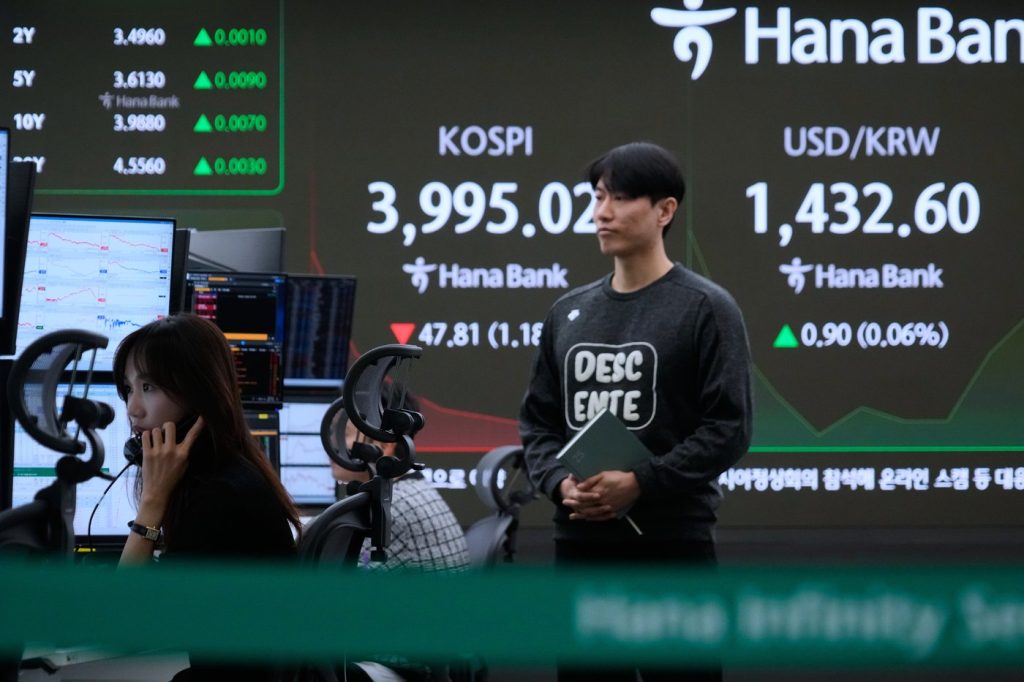TOKYO (AP) - Asian shares exhibited a mixed performance on Tuesday, as investors closely monitored the developments surrounding a planned meeting between President Donald Trump and China's top leader, Xi Jinping. The anticipation of potential trade agreements between the two leaders has heightened market interest.
In regional markets, Hong Kong's Hang Seng Index saw a slight increase of 0.1%, reaching 26,451.08, while the Shanghai Composite Index gained 0.2% to 4,005.44, marking its highest point in a decade. This rise reflects optimism regarding trade relations, which have been strained since Trump returned to the White House.
President Trump has expressed optimism about forging a new trade agreement with President Xi during their meeting at the Pacific Rim summit in South Korea later this week. Such an agreement could help ease the trade tensions that have been disrupting global markets and business operations.
In Japan, however, the benchmark Nikkei 225 index dipped 0.2% to 50,419.96 in early trading. This decline follows a period of record highs after Sanae Takaichi became the country's first female prime minister. On the same day, Trump was scheduled to meet with Takaichi, visit a U.S. military base, and engage with business leaders in Tokyo to reaffirm the security alliance between the two nations. Japan is committed to adhering to Trump's demands for heightened investments, a more significant role in its defense, and increased imports from the United States.
Market analyst Stephen Innes, managing partner at SPI Asset Management, noted the prevailing caution among traders: “So Asia opens not with fireworks, but with an uneasy calm – a market breath half held. Traders aren’t chasing the rumor this time; they’re watching, weighing, waiting for something real to sign.”
In Australia, the S&P/ASX 200 index fell 0.4% to 9,017.80, while South Korea’s Kospi experienced a more considerable decline, shedding 1.2% to 3,992.77, despite the nation reporting strong quarterly economic growth fueled by robust consumption, investments, and exports.
On Wall Street, stocks reached new heights on Monday, with the S&P 500 climbing 1.2% to 6,875.16. The Dow Jones Industrial Average increased by 0.7% to 47,544.59, and the Nasdaq composite surged by 1.9% to 23,637.46. The U.S. stock market has been riding a wave of record-breaking rallies, with the S&P 500 soaring an impressive 38% since hitting a low in April when concerns about Trump’s tariffs were at their peak.
This rally has been attributed to hopes of mitigating trade tensions, alongside expectations for additional economic developments. One of the key factors is the belief that the Federal Reserve will continue to cut interest rates to bolster a slowing job market. The Fed's next announcement regarding interest rates is anticipated on Wednesday, with traders widely expecting a quarter-point cut for the second consecutive meeting.
However, there is uncertainty surrounding this decision, as the Fed has cautioned that it may need to reassess its strategy if inflation rates rise significantly. Low-interest rates could exacerbate inflationary pressures, leading to a complex balancing act for policymakers.
In addition to interest rate cuts, another expectation supporting stock prices is that U.S. companies will continue showing solid profit growth. Significant companies, including Alphabet, Meta Platforms, and Microsoft, are set to release their earnings results this week, with Amazon and Apple also on the schedule.
In the bond market, the yield on the 10-year Treasury note slipped to 3.99% from 4.02% late on Friday. In energy trading, benchmark U.S. crude experienced a slight decrease of 3 cents, reaching $61.28 a barrel, while Brent crude edged down 2 cents to $64.86 a barrel.
In currency trading, the U.S. dollar fell to 152.41 Japanese yen from 152.88 yen, and the euro rose to $1.1658 from $1.1645. Overall, the global markets are navigating a period of uncertainty, with traders keenly observing upcoming political developments and economic indicators.











